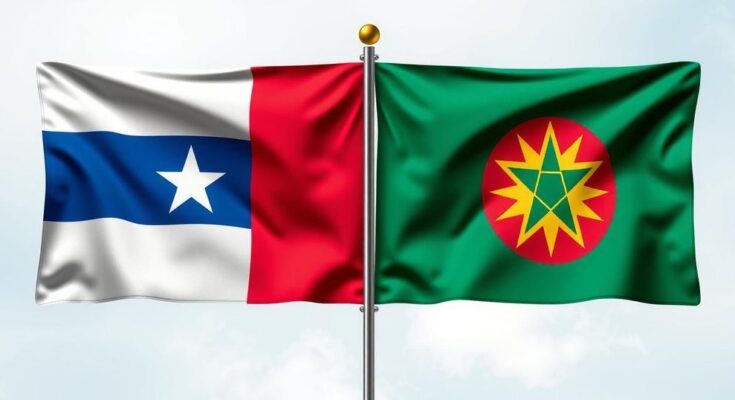Somalia and Ethiopia are set to resume full diplomatic relations following President Hassan Sheikh Mohamud’s visit to Addis Ababa, aimed at reconciling a year-long rift. The leaders agreed to enhance bilateral ties and address security concerns while reflecting on the implications of Ethiopia’s deal with Somaliland. Turkey’s mediation has been crucial in fostering peace between the two nations.
Somalia and Ethiopia are moving to restore full diplomatic relations following a recent visit by Somalia’s President, Hassan Sheikh Mohamud, to Addis Ababa. This visit signifies attempts to mend a rift that has lingered for over a year, which had the potential to escalate instability within the Horn of Africa. In a joint statement issued on social media platform X, President Mohamud and Ethiopian Prime Minister Abiy Ahmed announced their mutual agreement to reinstate and strengthen their diplomatic ties in their respective capitals.
The historical grievances between these two neighboring countries were exacerbated when Ethiopia entered an agreement with Somaliland, a region seeking independence, to establish a port and military presence in exchange for recognizing its sovereignty. This caused significant outrage in Somalia and resulted in the expulsion of Ethiopia’s ambassador from Mogadishu in April of the previous year, marking a formal break in relations. However, a recent peace accord, mediated by Turkey, has helped reduce tensions and was reaffirmed during President Mohamud’s recent visit.
During discussions in Addis Ababa, both leaders focused on fostering trade and enhancing security cooperation, particularly in combating extremist militant groups that threaten regional stability. Nevertheless, uncertainties about the specifics of Ethiopia’s future access to the sea and the implications of its agreement with Somaliland remain. Additionally, Somalia’s Foreign Minister has been engaging with counterparts from Egypt and Eritrea to solidify their opposition to Ethiopia’s expansions. They emphasized that security over the Red Sea should be determined by coastal nations alone, reinforcing the newly formed alliance between these countries to counter Ethiopia’s influence.
Amid these geopolitical dynamics, it is noteworthy that Egyptian forces have augmented the African Union Support and Stabilisation Mission in Somalia, further demonstrating the growing military bonds between Egypt and Somalia in light of shared concerns regarding Ethiopia’s actions.
The restoration of diplomatic relations between Somalia and Ethiopia comes at a crucial time as both nations seek to address longstanding tensions that have historically destabilized the Horn of Africa. The roots of the rift can be traced back to Ethiopia’s controversial agreement with Somaliland, a separatist region, which prompted strong reactions from Somalia. Mediation efforts, particularly by Turkey, have been pivotal in brokering peace and understanding between the two nations. The implications of these developments are significant not only for Somali-Ethiopian relations but also for the broader regional geopolitical landscape as neighboring countries, such as Egypt and Eritrea, align against Ethiopia’s ambitions.
In summary, the restoration of diplomatic relations between Somalia and Ethiopia marks a significant step toward regional stability and shows both countries’ commitment to resolving historical grievances. While progress has been made through recent dialogues and agreements, several unresolved issues remain, particularly concerning Ethiopia’s access to maritime resources and its arrangements with Somaliland. The evolving relationships between allied nations in the region also indicate shifting power dynamics that will require careful attention moving forward.
Original Source: www.thenationalnews.com




